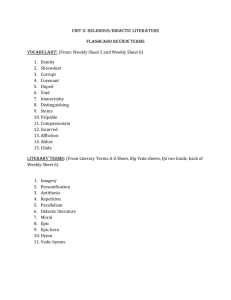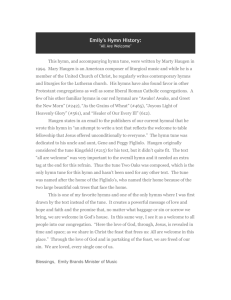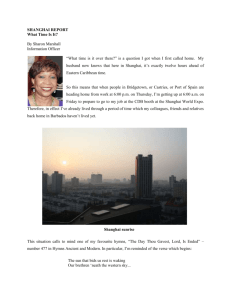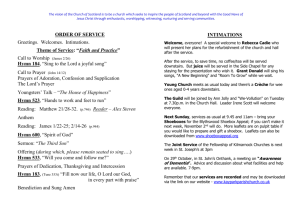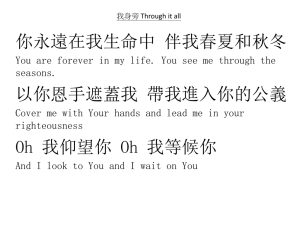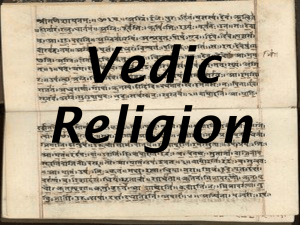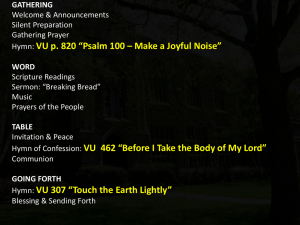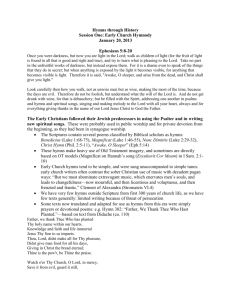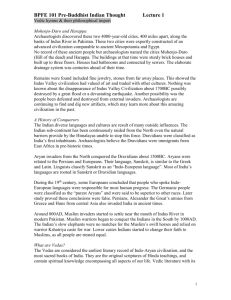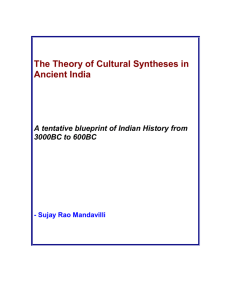Rig Veda - Harrison Humanities
advertisement
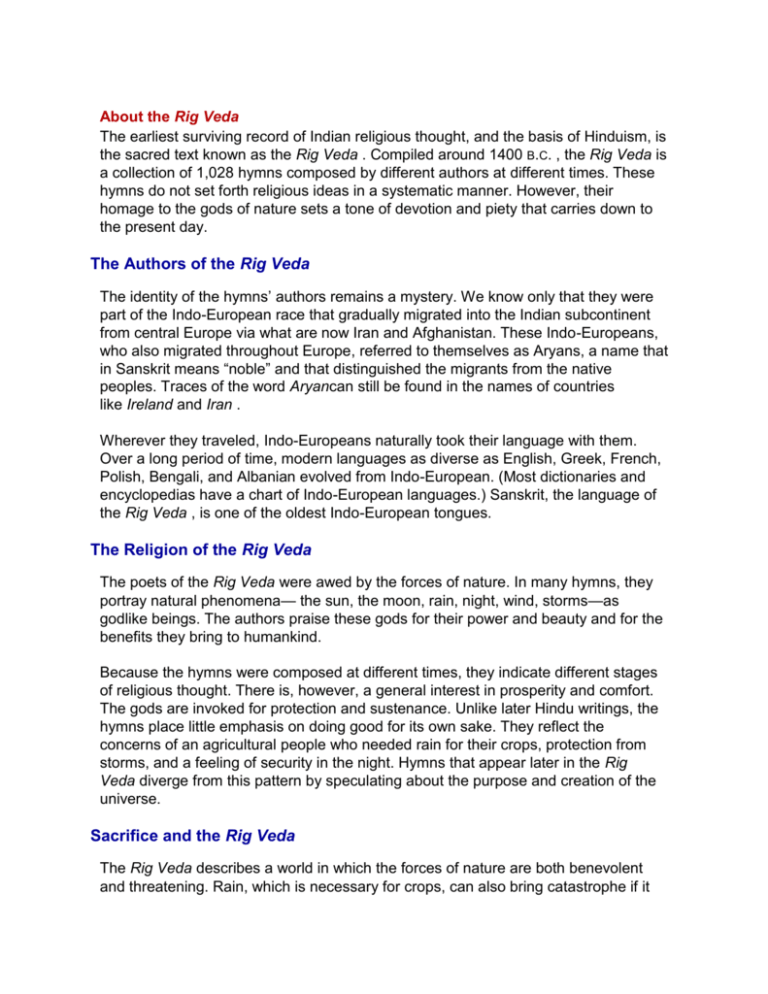
About the Rig Veda The earliest surviving record of Indian religious thought, and the basis of Hinduism, is the sacred text known as the Rig Veda . Compiled around 1400 B.C. , the Rig Veda is a collection of 1,028 hymns composed by different authors at different times. These hymns do not set forth religious ideas in a systematic manner. However, their homage to the gods of nature sets a tone of devotion and piety that carries down to the present day. The Authors of the Rig Veda The identity of the hymns’ authors remains a mystery. We know only that they were part of the Indo-European race that gradually migrated into the Indian subcontinent from central Europe via what are now Iran and Afghanistan. These Indo-Europeans, who also migrated throughout Europe, referred to themselves as Aryans, a name that in Sanskrit means “noble” and that distinguished the migrants from the native peoples. Traces of the word Aryancan still be found in the names of countries like Ireland and Iran . Wherever they traveled, Indo-Europeans naturally took their language with them. Over a long period of time, modern languages as diverse as English, Greek, French, Polish, Bengali, and Albanian evolved from Indo-European. (Most dictionaries and encyclopedias have a chart of Indo-European languages.) Sanskrit, the language of the Rig Veda , is one of the oldest Indo-European tongues. The Religion of the Rig Veda The poets of the Rig Veda were awed by the forces of nature. In many hymns, they portray natural phenomena— the sun, the moon, rain, night, wind, storms—as godlike beings. The authors praise these gods for their power and beauty and for the benefits they bring to humankind. Because the hymns were composed at different times, they indicate different stages of religious thought. There is, however, a general interest in prosperity and comfort. The gods are invoked for protection and sustenance. Unlike later Hindu writings, the hymns place little emphasis on doing good for its own sake. They reflect the concerns of an agricultural people who needed rain for their crops, protection from storms, and a feeling of security in the night. Hymns that appear later in the Rig Veda diverge from this pattern by speculating about the purpose and creation of the universe. Sacrifice and the Rig Veda The Rig Veda describes a world in which the forces of nature are both benevolent and threatening. Rain, which is necessary for crops, can also bring catastrophe if it comes at the wrong time. The hymns were therefore recited at sacrificial offerings intended to win the favor of the gods and to ward off natural disturbances and chaos. The earliest Vedic poets sought to please the gods through offerings of food and drink. They thought that such gifts would incline the forces of nature to perform beneficially for humans. The idea gradually evolved, however, that sacrifice is not only helpful to the gods, since it provides them with sustenance and praise, but is actually necessary for them. Eventually, the notion emerged that sacrifice controls the gods and the order of the universe. This belief gave the priests, who supervised the sacrifice, enormous power and influence. The ancient practice of Vedic sacrifice is slowly dying out in modern India and is being replaced by other religious rituals based on the Rig Veda . Preview Connecting to the Literature The Rig Veda offers clues to an ancient civilization yet also reflects timeless concerns. Like the speaker in the hymn “Night,” we too have nighttime fears, despite all our modern protections. Also, like the speaker in “Creation Hymn,” we wonder about the origin of the universe. Literary Analysis Vedic Hymn A hymn is a poem or song of praise. Vedic hymns emphasize the importance of gods and nature in Indian life and ponder timeless questions, such as the origin of the universe. These hymns were originally meant to be chanted, and they were passed down through the ages by word of mouth before they were written. While reading, look for devices that reflect this oral tradition, such as the repetition of words or of grammatical structure. Comparing Literary Works “Creation Hymn” and “Night” both involve mysteries of nature, but they approach their uncertainties from different angles. “Night” uses concrete language and familiar terms to make the unknown easier to comprehend. For example, the speaker uses personification, a description of something non-human as if it were human, to make the night seem less foreboding. The speaker also addresses the night directly, as in the following passage: As you came near to us today, we turned homeward to rest, as birds go to their home in a tree. “Creation Hymn,” in contrast, confronts the unknown on an abstract level. The hymn speaks of concepts such as existence and immortality and leaves many questions purposely unanswered. As you read these hymns, think about the ways in which “Night” tries to remove nature’s mystery while “Creation Hymn” embraces it. Background Vedic poets are in awe of nature, but they also desire to control and understand it. By endowing natural forces with the qualities of humans and animals, as in “Night,” Vedic poets make it easier to approach, flatter, and manage these forces. Such attempts at control lead to thoughts about the workings and origin of the world, speculations that will become even more important in later Hindu texts. Of all the Vedic poems, the “Creation Hymn” represents the most self-conscious effort to fathom the world’s mysteries. Creation Hymn 1There was neither non-existence nor existence then; there was neither the realm of space nor the sky which is beyond. What stirred? Where? In whose protection? Was there water, bottomlessly deep? 2There was neither death nor immortality then. There was no distinguishing sign of night nor of day. That one breathed, windless, by its own impulse. Other than that there was nothing beyond. 3Darkness was hidden by darkness in the beginning; with no distinguishing sign, all this was water. The life force that was covered with emptiness, that one arose through the power of heat. 4Desire came upon that one in the beginning; that was the first seed of mind. Poets seeking in their heart with wisdom found the bond of existence in non-existence. 5Their cord was extended across. Was there below? Was there above? There were seed-placers; there were powers. There was impulse beneath; there was giving-forth above. 6Who really knows? Who will here proclaim it? Whence was it produced? Whence is this creation? The gods came afterwards, with the creation of this universe. Who then knows whence it has arisen? 7Whence this creation has arisen—perhaps it formed itself, or perhaps it did not—the one who looks down on it, in the highest heaven, only he knows—or perhaps he does not know. Night 1The goddess Night has drawn near, looking about on many sides with her eyes. She has put on all her glories. 2The immortal goddess has filled the wide space, the depths and the heights. She stemsthe tide of darkness with her light. 3The goddess has drawn near, pushing aside her sister the twilight. Darkness, too, will give way. 4As you came near to us today, we turned homeward to rest, as birds go to their home in a tree. 5People who live in villages have gone home to rest, and animals with feet, and animals with wings, even the ever-searching hawks. 6Ward off the she-wolf and the wolf; ward off the thief. O night full of waves, be easy for us to cross over. 7Darkness—palpable black, and painted—has come upon me. O Dawn, banish it like a debt. 8I have driven this hymn to you as the herdsman drives cows. Choose and accept it, O Night, daughter of the sky, like a song of praise to a conqueror. Critical Reading 1. Respond: To which of the hymns did you relate more, “Creation Hymn” or “Night”? Explain. 2. (a) Recall: How is the world described in the first two lines of “Creation Hymn”? (b) Infer: Why does the hymn say what was not rather than what was? 3. (a) Recall: Identify two specific questions the poet wants answered in “Creation Hymn.” (b) Infer: Why can’t the gods answer these questions?(c) Deduce: What does the gods’ inability to answer suggest about the questions themselves? 4. (a) Recall: In “Night,” what does the speaker ask the goddess Night to do?(b) Analyze: How might this request help the speaker and audience of this hymn feel safer in the darkness? 5. Evaluate: How successful are these hymns at expressing their central ideas? Explain.
